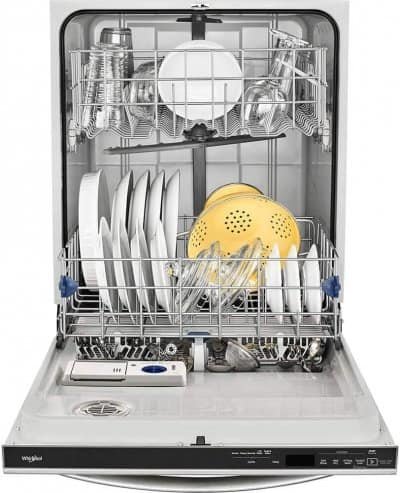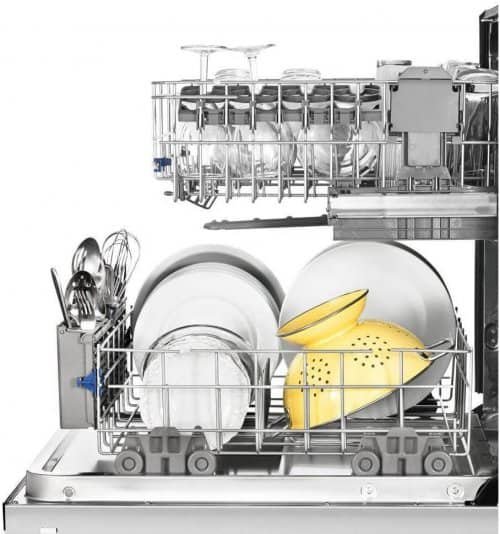The dishwasher is a convenient appliance that helps streamline our daily chores and keeps our dishes clean. However, not everything can be safely placed in the dishwasher. In this article, we will explore what items should be kept out of the dishwasher to ensure their longevity and avoid potential damage. By following these guidelines, you can maintain your kitchenware in excellent condition and make the most out of your dishwasher.
Table of Contents
Understanding Dishwasher Basics
Before diving into the items that should not be put in a dishwasher, it’s important to understand how dishwashers work. Dishwashers use a combination of hot water, detergent, and mechanical action to remove food particles and stains from dishes. While dishwashers are designed to handle a wide range of kitchenware, certain materials and items can be vulnerable to the harsh conditions inside the dishwasher.
Items to Avoid Putting in the Dishwasher
- Delicate Glassware and Crystal
- Wooden Utensils and Cutting Boards
- Cast Iron Cookware
- Nonstick Pans
- Plastic Containers
- Sharp Knives
- Gold or Silver Plated Items
- Aluminum Cookware
- Fine China
- Copper Utensils
- Insulated Travel Mugs
- Hand-painted or Handcrafted Items
- Non-dishwasher Safe Plastics
- Electronics and Appliances
- Greasy or Oily Items
Delicate Glassware and Crystal
Delicate glassware and crystal should be hand washed instead of being placed in the dishwasher. The high temperatures and intense water pressure in the dishwasher can cause them to break, chip, or lose their luster. It is best to take extra care with these items to preserve their beauty and prevent any damage.
Wooden Utensils and Cutting Boards
Wooden utensils and cutting boards should not be subjected to the dishwasher’s heat and moisture. The water can cause the wood to swell and warp, compromising their structural integrity. Hand wash these items with mild soap and water to keep them in good condition.
Cast Iron Cookware
Putting cast iron cookware in the dishwasher is a big no-no. The harsh detergent and high temperatures can strip the seasoning off the cast iron, leading to rusting and diminished non-stick properties. Instead, hand wash your cast iron cookware with minimal soap and water, and remember to season it properly after each use.
Nonstick Pans
Nonstick pans are another item that should be excluded from the dishwasher. The dishwasher’s abrasive action can wear down the nonstick coating, rendering the pans less effective over time. To maintain the nonstick surface, hand washing with gentle dish soap is recommended.
Plastic Containers
While many plastic containers are labeled as “dishwasher safe,” it’s still a good idea to avoid putting them in the dishwasher. The hot water and high temperatures can cause plastic to warp, melt, or release harmful chemicals. Hand washing plastic containers will help preserve their shape and integrity.
Sharp Knives
Dishwashers can be detrimental to sharp knives. The jostling and banging inside the dishwasher can cause blades to become dull or chip. Additionally, the high heat and moisture can lead to rusting. Hand washing knives with mild soap and water is the safest way to clean and maintain their sharpness.
Gold or Silver Plated Items
Gold or silver plated items should never be put in the dishwasher. The high heat and harsh detergents can strip away the delicate plating, leaving them tarnished and discolored. These items require gentle hand washing and polishing to preserve their elegance.
Aluminum Cookware
Aluminum cookware should be kept out of the dishwasher due to its reactive nature. The dishwasher’s heat and detergents can cause aluminum to oxidize and develop a dull appearance. Hand washing with non-abrasive cleaners is recommended to maintain the shine of your aluminum cookware.
Fine China
Fine china is prone to chipping and cracking in the dishwasher. The delicate nature of these dishes makes them susceptible to damage from the dishwasher’s intense water pressure. Hand wash your fine china using mild soap and water for optimal care.
Copper Utensils
Copper utensils are not suitable for dishwasher use. The high heat and moisture can cause the copper to tarnish and lose its shine. Hand washing copper utensils with a mild cleanser and gentle scrubbing will help preserve their appearance.
Insulated Travel Mugs
Insulated travel mugs often have vacuum seals and intricate parts that can be damaged in the dishwasher. The intense heat and forceful water spray can compromise the insulation and functionality of these mugs. It’s best to hand wash them to ensure their longevity.
Hand-painted or Handcrafted Items
Hand-painted or handcrafted items are typically delicate and require special care. The dishwasher’s high temperatures and water pressure can cause the paint to fade or chip, ruining the artistic appeal of these items. It is recommended to hand wash them gently to maintain their beauty.
Non-dishwasher Safe Plastics
Certain plastics are not designed to withstand the dishwasher’s heat and can warp, melt, or release toxins. Always check the packaging or manufacturer’s instructions to determine if your plastic items are dishwasher safe. If they are not, hand washing is the best way to clean them.
Electronics and Appliances
Electronics and appliances should never be placed in the dishwasher. The water and heat can damage their internal components, rendering them unusable or even dangerous. Always refer to the manufacturer’s instructions for proper cleaning methods.
Greasy or Oily Items
Greasy or oily items should be cleaned of excess oil before placing them in the dishwasher. The dishwasher’s detergent may not effectively remove heavy grease, leading to clogged filters and poor cleaning performance. Wipe off excess grease before loading these items into the dishwasher.

Tips for Proper Dishwasher Use
To ensure optimal performance and prolong the life of your dishwasher, consider the following tips:
- Read the manufacturer’s manual for specific guidelines on loading and care.
- Scrape off excess food debris before loading dishes into the dishwasher.
- Use the appropriate dishwasher detergent and follow the recommended dosage.
- Load the dishwasher properly, ensuring dishes are not overcrowded.
- Avoid using harsh cleaners or abrasive scrubbing pads on the dishwasher’s interior.
- Regularly clean and maintain your dishwasher according to the manufacturer’s instructions.
Can I put ceramic dishes in the dishwasher?
Most ceramic dishes are dishwasher safe. However, it’s important to check the manufacturer’s instructions or markings on the dish to ensure it is dishwasher safe.
Are stainless steel utensils safe to put in the dishwasher?
Yes, stainless steel utensils are generally safe to put in the dishwasher. However, prolonged exposure to harsh dishwasher detergents may cause some stainless steel items to develop a dull appearance.
Can I put my blender or food processor parts in the dishwasher?
It depends on the manufacturer’s instructions. Some blender or food processor parts are dishwasher safe, while others may need to be hand washed. Refer to the user manual or check the product packaging for guidance.
What is the best way to clean dishwasher-safe plastics?
Dishwasher-safe plastics can be safely cleaned in the dishwasher. However, to ensure their longevity, it is recommended to use the top rack and a gentle dishwasher cycle.
Can I put porcelain dishes in the dishwasher?
Porcelain dishes are generally dishwasher safe. However, if the porcelain has delicate decorative elements or gold/silver accents, it’s best to hand wash them to prevent any damage.
Conclusion
In conclusion, while dishwashers are convenient appliances for cleaning dishes, there are certain items that should not be put in them. Delicate glassware, wooden utensils, cast iron cookware, nonstick pans, plastic containers, sharp knives, gold or silver plated items, aluminum cookware, fine china, copper utensils, insulated travel mugs, hand-painted or handcrafted items, non-dishwasher safe plastics, electronics and appliances, and greasy or oily items should all be hand washed to avoid damage and maintain their quality.
By understanding what not to put in a dishwasher and following the recommended care instructions, you can ensure that your kitchenware remains in excellent condition and maximize the efficiency of your dishwasher.

